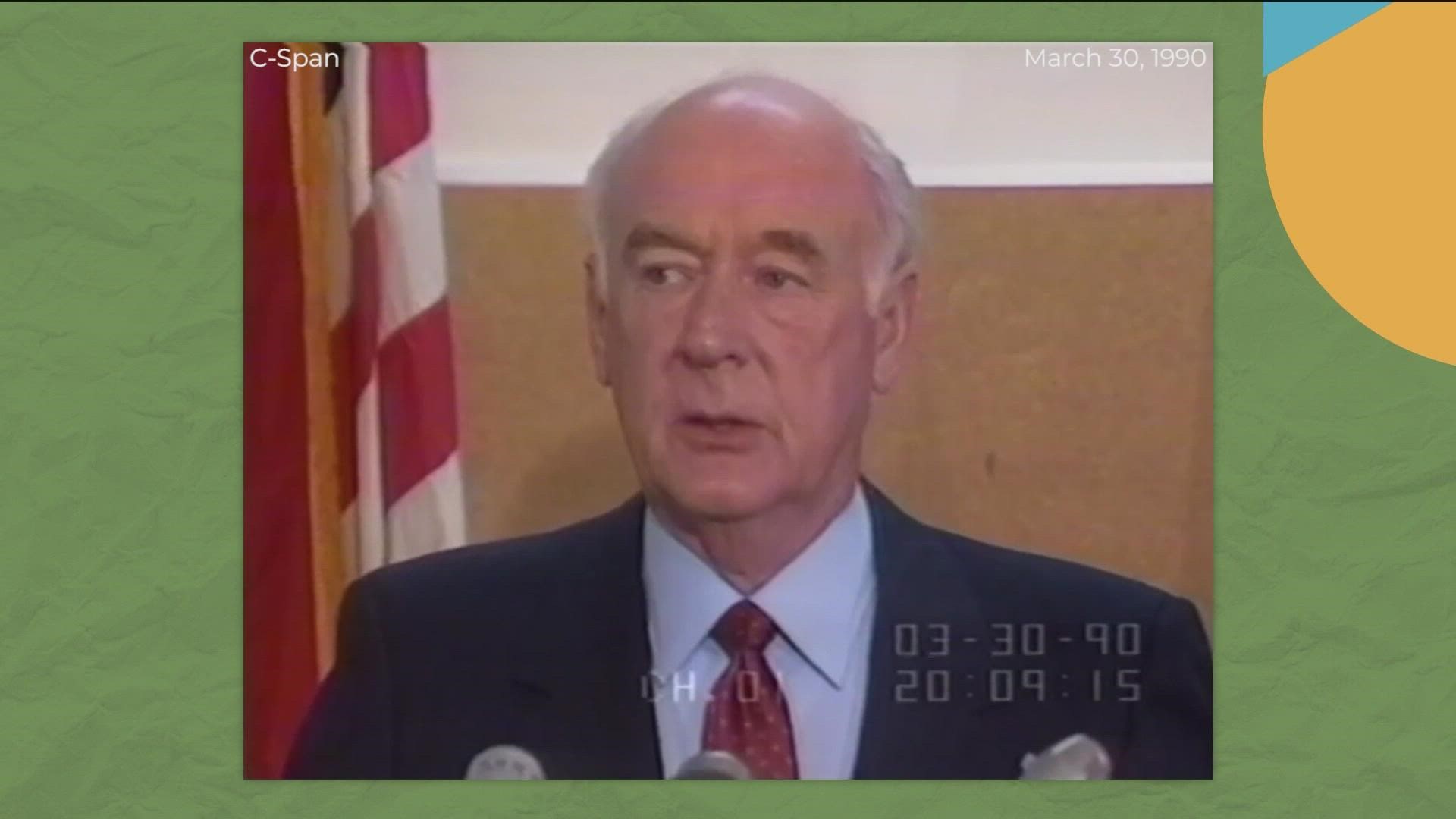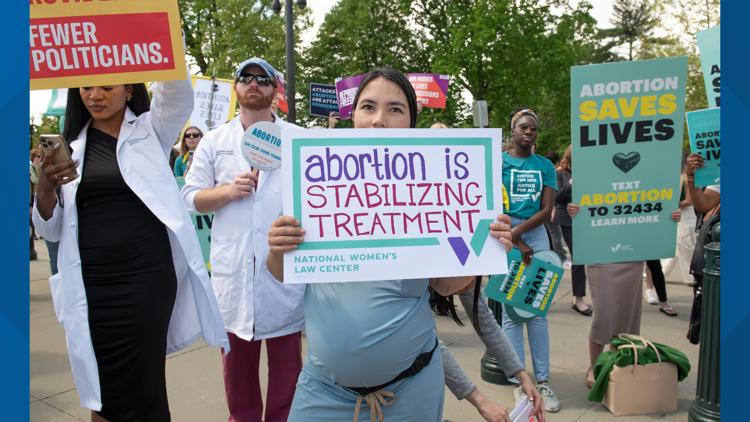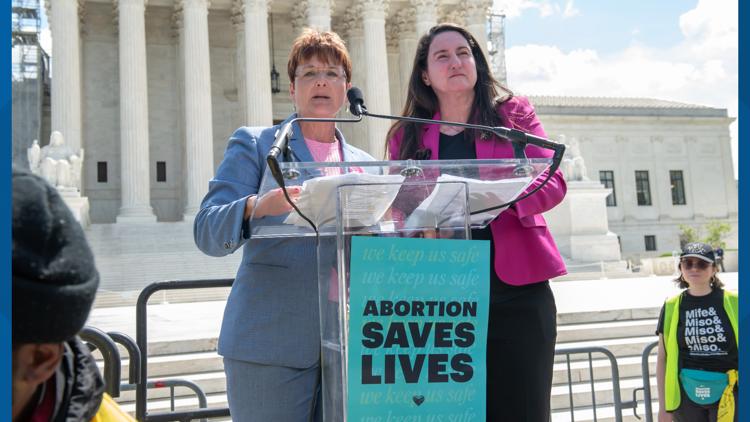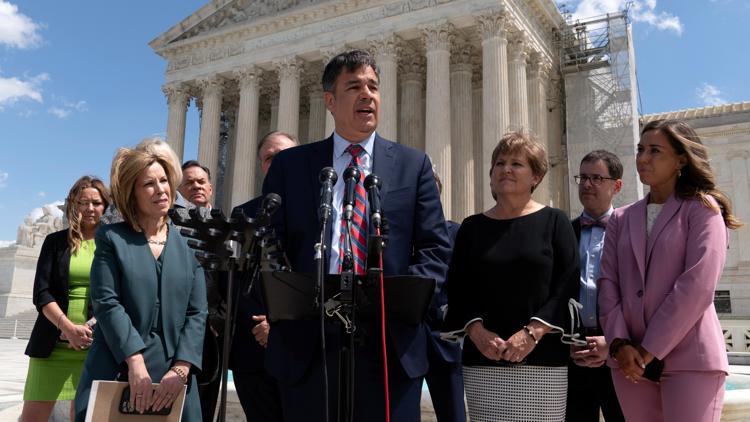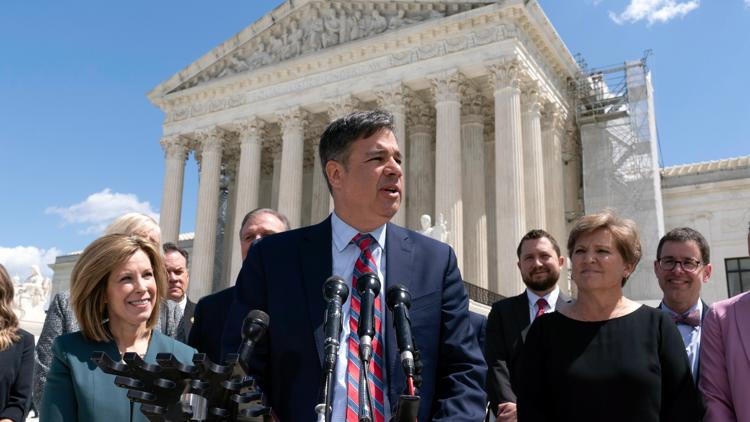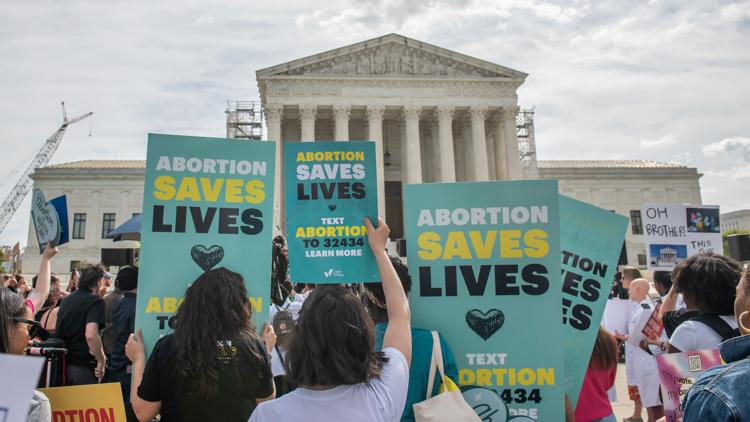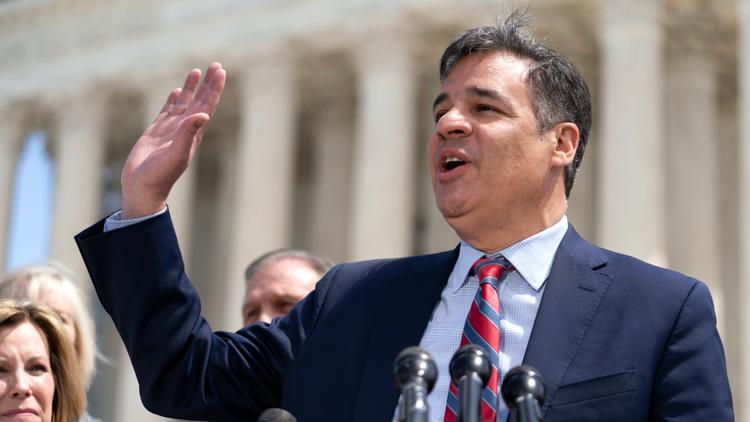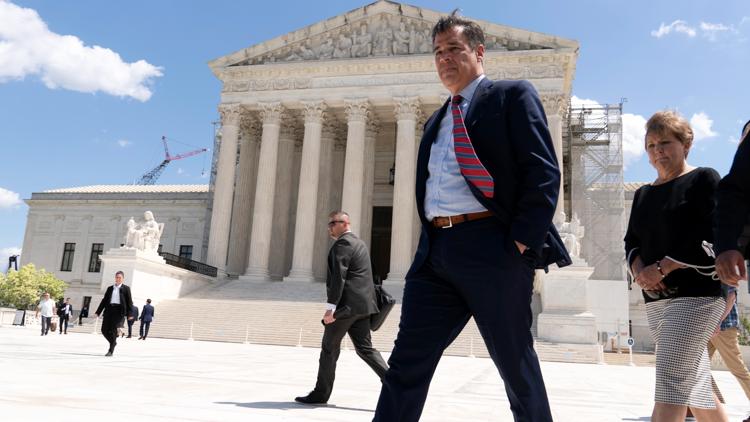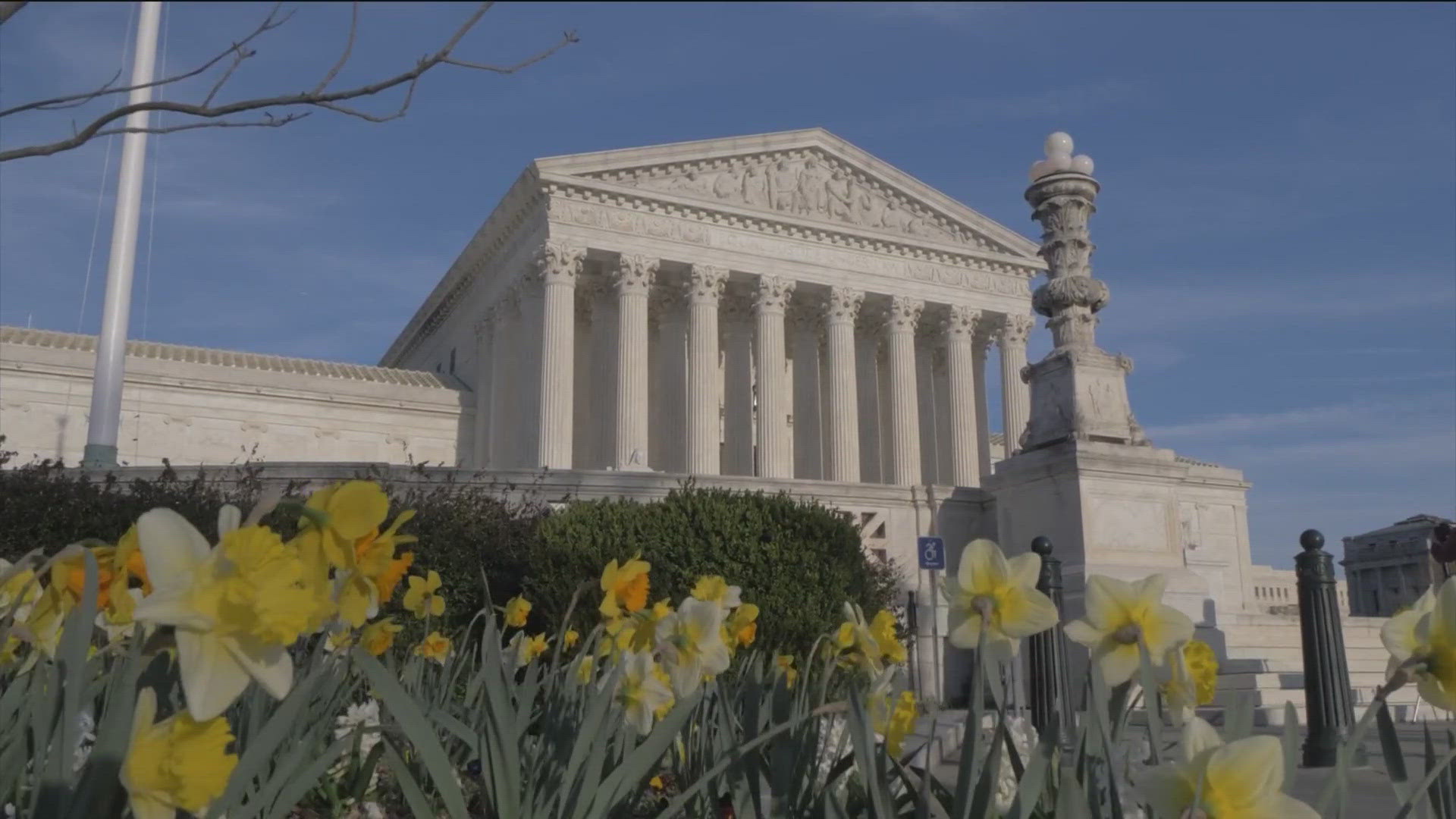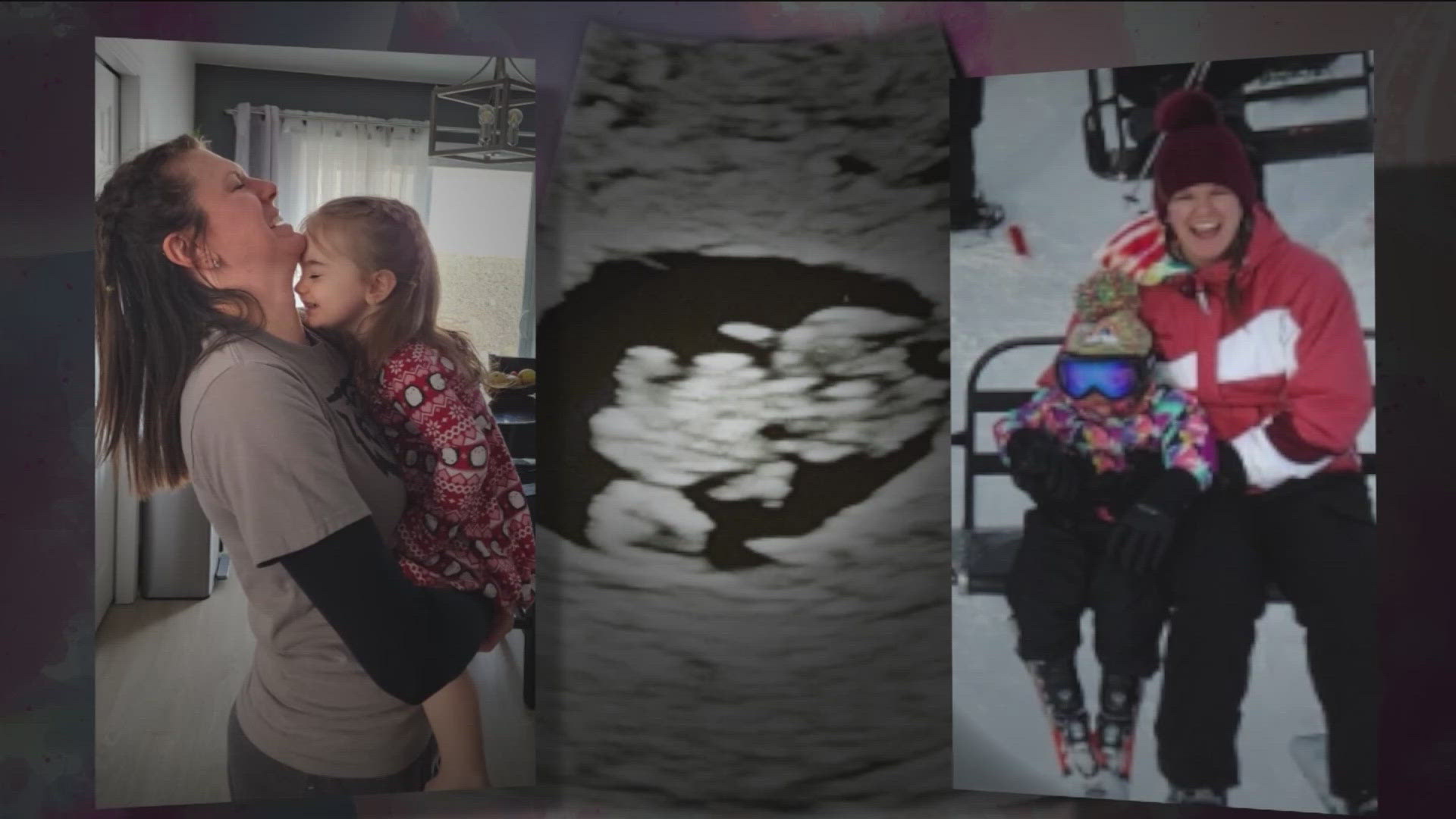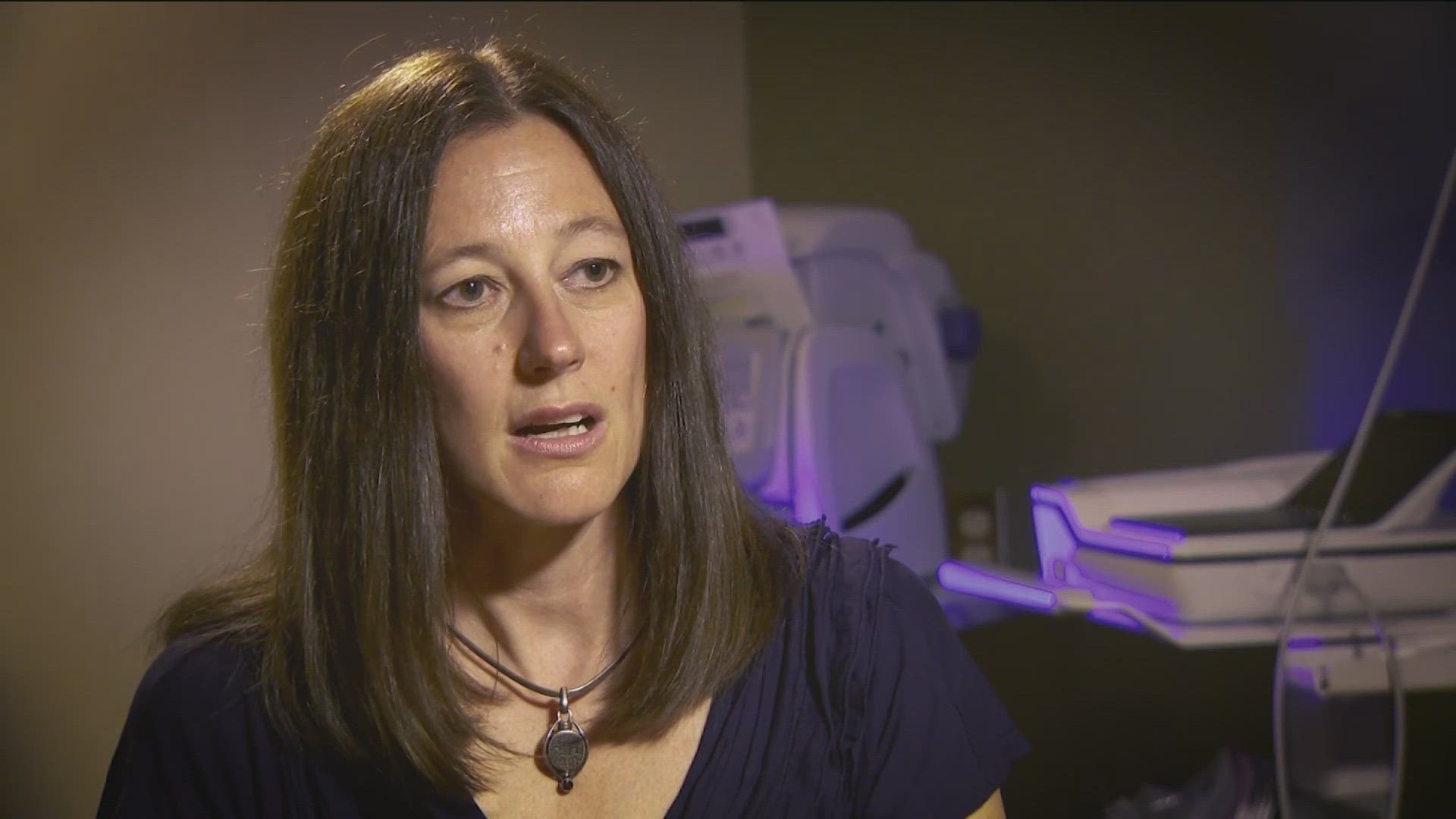'I think it could potentially ignite a collapse of our health care system' | Abortion in Idaho
Ahead of the Supreme Court's expected decision on Idaho's near-total abortion ban, The 208 is hearing from doctors, lawmakers, and women impacted by Idaho's laws.
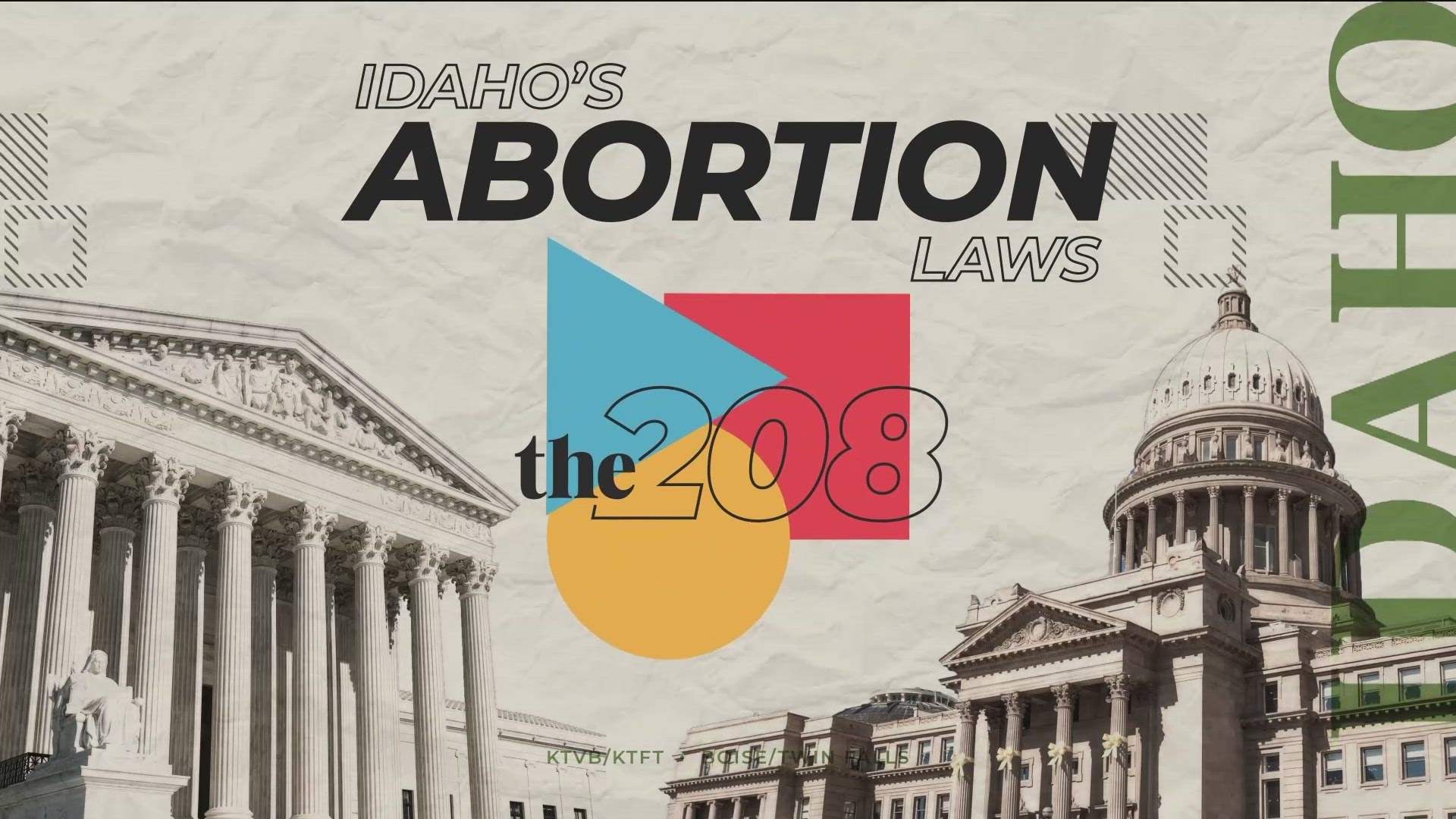
As the country waits for the Supreme Court of the United States (SCOTUS), to release its decision on Moyle vs. United States, KTVB is airing a multi-part series about Idaho's abortion laws and their impact on Idahoans.
More stories and videos will be added as they air. Watch The 208 on Wednesday, Thursday, and Friday for the latest.
Idaho Abortion Timeline
1970: Roe v. Wade lawsuit
A woman known as Jane Roe, a name used in court documents to protect her privacy, sued a Dallas County district attorney by the name of Henry Wade. Roe claimed Texas' abortion laws violated her right to privacy, which she says were protected by the first, fourth, fifth, ninth, and 14th Amendments.
The law outlawed abortions except in cases where the life of the mother was at risk, rape or incest.
1971: Roe v. Wade SCOTUS arguments
In December 1971, the Supreme Court heard arguments challenging the law.
1973: Roe v. Wade decision
SCOTUS ultimately ruled abortion was a fundamental right. The ruling also meant states could impose some restrictions, including banning abortions after the fetus was viable and could live outside the womb.
1986: Emergency Medical Treatment & Labor Act (EMTALA) goes into effect
In 1986, Congress enacted EMTALA after reports of hospitals and emergency rooms nationwide denying patients care because they could not pay or were uninsured. The law requires anyone in an emergency medical situation or in labor who goes to a hospital or emergency room that receives medicare funding, must receive stabilizing care, regardless of ability to pay.
Idaho lawmakers introduced House Bill 635, aiming to outlaw abortion with some exceptions. It passed the House 47-36, as well as the Senate 25-17. It then went to Governor Cecil D. Andrus' desk for his signature on the last day of the legislative session.
Though Andrus, a Democrat, was against abortion, he vetoed the bill for three reasons: the exceptions were too narrow, the bill was drawn up by out-of-state parties, and was unconstitutional.
2015: Idaho bans abortion-inducing medicine via telemedicine
Then Governor Butch Otter signed a bill into law that required doctors to be present when prescribing abortion pills. It also required doctors to make "all reasonable efforts" to schedule follow-up appointments.
In 2017, Idaho stopped enforcing the law after Planned Parenthood sued the state.
2020: Idaho 'trigger bill' passed intending to ban nearly all abortions in Idaho
In March 2020, in hopes that Roe v. Wade would be overturned, the legislature passed Senate Bill 1385, also known as the abortion 'trigger bill.' The bill banned nearly all abortions in Idaho, except in cases of rape or incest (with a police report), or to save the life of the mother.
The bill went into effect within 30 days of Roe v. Wade being overturned.
2021: Fetal Heartbeat Bill, No Public Funds for Abortion Act
In March, lawmakers passed House Bill 366, also known as the 'fetal heartbeat bill.' It banned abortions once a heartbeat can be detected, with exceptions for rape, incest, or to save the life of the mother. The law also allowed the woman to sue the doctor who provided the abortion. If found guilty, the doctor could serve up to five years in prison.
It also had a 'trigger provision,' meaning it went into effect within 30 days after Roe v. Wade was overturned.
Lawmakers also passed House Bill 220, called the No Public Funds for Abortion Act. The law says no public funds can be used for abortions or abortion referrals, specifically with funds from tuition and fees paid to public universities.
On June 24, 2022, the Supreme Court upheld a Mississippi law in a 6-3 decision, making abortions illegal after the 15th week of pregnancy.
On August 2, 2022, the U.S. Department of Justice filed a lawsuit against the state, claiming it violated EMTALA.
"If a patient comes into an emergency room with a medical emergency jeopardizing the person's life or health, the hospital must provide the treatment necessary to stabilize that patient, this includes abortion when that is the necessary treatment," Merrick Garland, the U.S. Attorney General said.
With that filing, a judge granted a preliminary injunction, meaning the law could not be enforced while the lawsuit went through the courts.
After sorting out early court challenges, the 'trigger bill' became law in Idaho on August 25, 2022.
Senate Bill 1309 allowed people, including the family of an alleged rapist, to sue doctors for performing abortions, while Senate Bill 1358 added attorney's fees and costs.
In his transmittal letter, Republican Governor Brad Little said, "While I support the pro-life policy in this legislation, I fear the novel civil enforcement mechanism will in short order be proven both unconstitutional and unwise." He also said he had "significant concerns with the unintended consequences this legislation will have on victims of sexual assault."
2023: Abortion trafficking bill made law
House Bill 242, makes it illegal for someone to take a minor out of state for an abortion without their parent's consent.
In November 2023, a federal judge put the Abortion Trafficking law on hold after a lawsuit was filed by two advocacy groups.
House Bill 374 aimed to clarify the term 'abortion' to "provide that certain actions and attempts shall not be considered criminal abortions."
The bill also included exceptions for molar and ectopic pregnancies.
It went into effect July 1, 2023.
2024: SCOTUS hears arguments on Moyle v. United States
In January, the Supreme Court agreed to hear oral arguments in Moyle v. United States. When they agreed to hear the case, they also lifted the injunction on Senate Bill 1385.
On April 24, the Supreme Court heard arguments in Moyle v. United States. The Justice Department, which was represented by Boise High grad and U.S. Solicitor General Elizabeth Prelogar, argued abortion care must be provided by hospitals under EMTALA. The state of Idaho, represented by Josh Turner with the Idaho Attorney General's Office, argued providing abortions under EMTALA violates state law.
In June, SCOTUS unanimously ruled to preserve access to Mifepristone, an abortion pill taken in two doses to induce an abortion within the first 10 weeks of pregnancy. It remains illegal in Idaho.
SCOTUS hears arguments on Idaho v. United States and Moyle v. United States
2020 Legislation
In the waning days of the 2020 legislative session, then-House Majority Leader Megan Blanksma (R-Hammett) brought Senate Bill 1385, later known as Idaho's abortion trigger law, to the house floor.
The bill was first introduced in the Senate by Sen. Todd Lakey (R-Nampa).
"Under this new section, those performing criminal abortion will be charged with a felony punishable by no less than two years and no more than five years in prison," Rep. Blanksma said on the floor in March of 2020.
The bill would criminalize abortion in Idaho should the Supreme Court, or an amendment to the U.S. Constitution, restore such authority to the states.
"There was an idea of, 'Well, this will never happen anyway,' Blanksma said in an interview in June 2024. "I think that was everyone's expectation of Roe (v Wade) in general, right? Is that nothing was ever going to change."
If it did change, abortion would only be allowed with a few exceptions: rape or incest reported to law enforcement, or to protect the life of the mother.
Governor Brad Little (R) signed the bill on March 24, 2020.

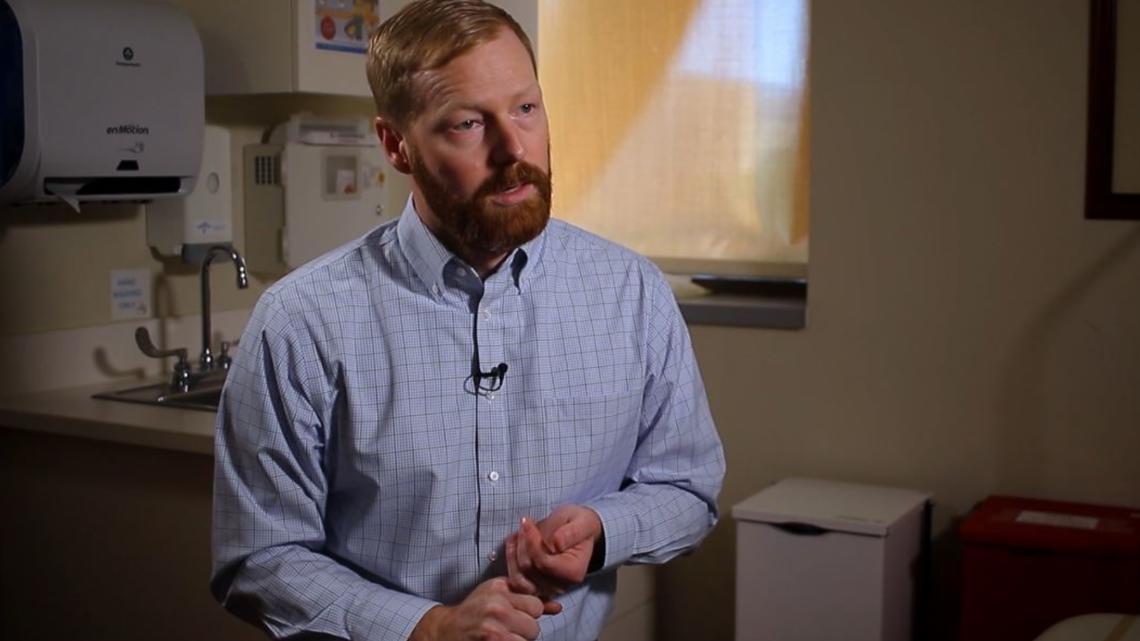
"Fetal anomalies don't know any bounds, they don't discriminate against anybody," said Dr. Duncan Harmon, one of just five Maternal Fetal Medicine specialists in Idaho.
These specialists are called on to care for fetuses with anomalies, which are more common than one might think.
"Roughly three percent of all pregnancies are affected with some sort of congenital anomaly and those kind of get filtered into us and our world," Dr. Harmon said.
He added that the exception for abortion to prevent the death of the mother puts him in an inverse relationship with his patients.
"The (closer) to death one becomes, the less liability I have of either going to jail, facing a criminal lawsuit, or losing my medical license because the patient is on death's do, but you don't want to get to that," he said. "I mean my Hippocratic Oath is to do no harm. I'm not going to sit and wait and watch somebody become sicker so that I become less liable. I want to act in the best interest of the patient and so many of those circumstances involve me transferring a patient out of state so they can receive appropriate medical care before deterioration occurs."
Dr. Harmon adds that EMTALA offers a Band-Aid of sorts for emergency room doctors but within a limited time frame.
"What about the patient that's not on death's door, but is developing or is headed down the route of developing complications that will ultimately lead to organ damage or a need for a transfusion or an ICU admission or a need for dialysis or a need for a hysterectomy and lose their potential fertility for the future," Dr. Harmon said. "We want to prevent even that from occurring and that's where the decision-making for us is a bit of a conundrum and the law says we can provide treatment, an abortion if it's necessary to prevent their death. But we are 9 or 10 steps before that potential end outcome."
"EMTALA is a small portion of what may help us treat patients appropriately because it's a small window of time but the bigger and more important change is the health exception."
Doctors wish that specific concern was considered more closely when the bill was being introduced and voted on in the legislature in 2020.

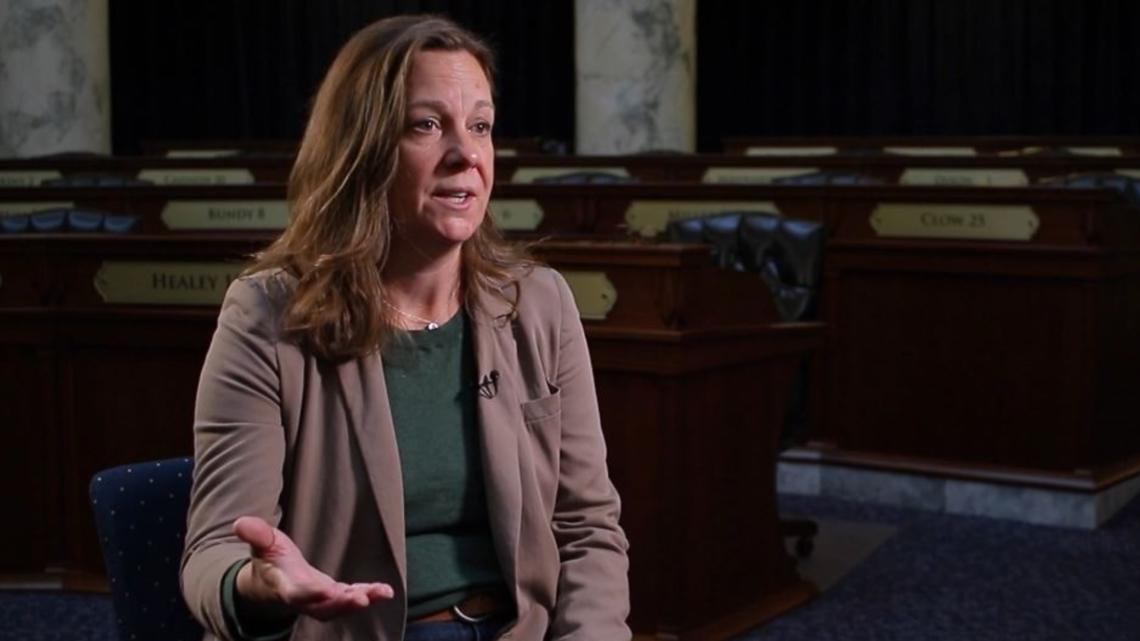
"I think knowing what we know now if we would've just tweaked it a little bit better on the initial move," Rep. Blanksma said.
While it's not uncommon for important legislation to land in the hands of leadership, she said she was asked to bring the bill to the house floor for one other reason.
"I was the only woman in leadership and I was assigned the bill," she said. "And so one of the discussions was, 'have Megan carry it'"
"Because you're a woman?" Brian Holmes asked.
"There's a lot to be said for how things look when you're presenting a certain type of legislation," Rep. Blanksma said. "I mean the optics are just not good when certain members are presenting."
"Did it give you pause to consider why you were chosen?" Holmes asked.
"Not at the time. I could have said no, but when you're working for the team, you're working for the team."
"In hindsight, I wish we'd had some more information because obviously there's some glitches in it," she said. "I think we're looking at there are so many complications that can happen with a pregnancy and I think to put it in black and white is a very difficult job... but I think there were some exceptions that just didn't come up at the time."
One of the solutions tossed around was changing the language from 'life of the mother' to 'health of the mother.'
"That's not so simple to move on the House floor because that's when we got that sliding scale," Rep. Blanksma said. "I understand what they're trying to say but then it becomes a very broad definition and that's when people start to get nervous about changing the existing law because they don't want doctors to make an excuse to start performing elective abortions that's the fear with that language."
In 2023, Rep. Blanksma tried to make some of that language clearer. House Bill 342 would remove the affirmative defense for the doctor, as well as adding 'to treat a physical condition of the woman that, if left untreated, would be life-threatening.'
That bill never got a hearing, but House Bill 374 did. However, it was without the language about the physical condition of the woman.
In a house committee hearing, Rep. Julianne Young (R-Blackfoot) voted in favor of the bill, saying, 'We want to make sure that health of the mother doesn't become so broad that everything becomes an exception to take the life of a potential child because unfortunately there are some that take that position.'
House Bill 374 eventually passed both houses and was signed into law by Governor Little.
"Just allow patients some sort of grace in a situation they didn't choose to be in," Dr. Harmon said.
A big part of his job now is counseling patients on their options when it comes to managing pregnancy complications or fetal diagnoses. Those discussions now include a third party.
"The third party in the room is the decisions that have been made outside of this room that impact what you can and can't do in this state," he said.
When counseling these women and their families through tough decisions, Dr. Harmon says that can include the option to send them out of state, saying its happened 'tons' of times.
"These are stories that don't come up in the media because these are very private moments that are devastating to families who have a very desired pregnancy and it's heartbreaking to them," he said.
"We've created some unintended consequences," Rep. Blanksma said. "I think there are those of us who believe the doctors are covered but when the doctor doesn't believe they're covered, that's where you have the problem, right?"
She said she doesn't know if there will be a change in the law.
"It's just going to take a negotiation and just the blanket health of the mother won't move, I don't think, in the next legislature for sure," she said. "It has too many consequences one way or another."
2024 SCOTUS Arguments
On April 24, 2024, abortion access took center stage in the nation's highest court.
The nine Supreme Court justices heard arguments in Moyle v. United States and the consolidated case, Idaho v. United States.

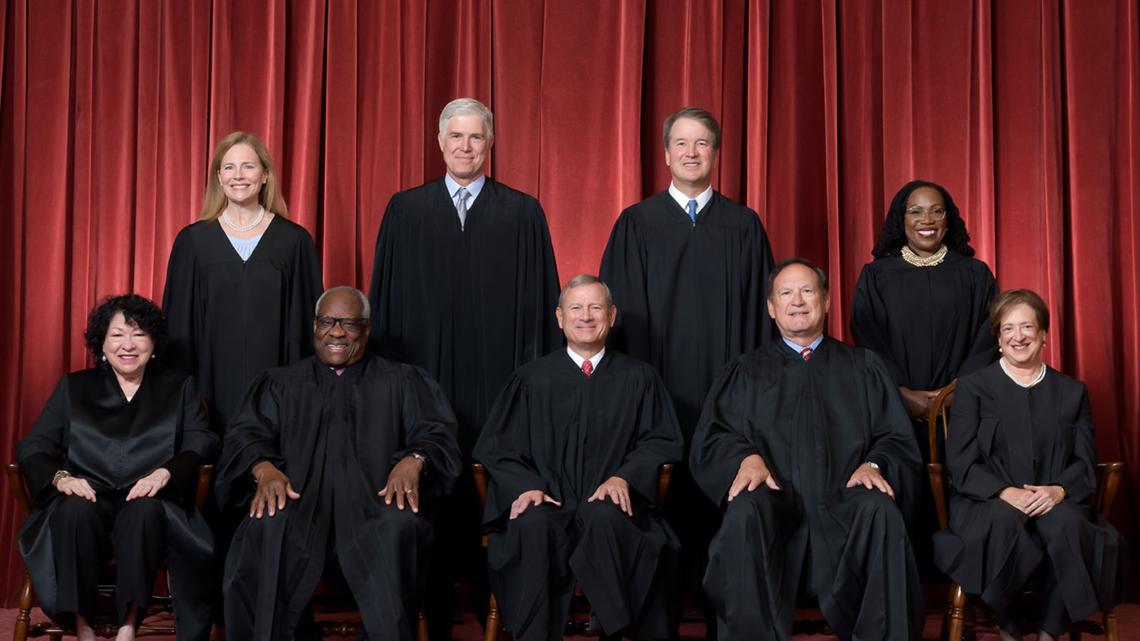
The issue at hand: whether Idaho's near-total abortion ban interferes with the Emergency Medical Treatment and Labor Act, also known as EMTALA, a federal law giving anyone access to emergency medical care.
Josh Turner with the Idaho Office of the Attorney General, represented Idaho in the arguments.
“EMTALA works precisely because states regulate the practice of medicine. And nothing in EMTALA requires doctors to ignore the scope of their license and offer medical treatments that violate state law," Turner said.
Representing the U.S., Solicitor General Elizabeth Preloger, a Boise High School grad.
"If a woman comes to an emergency room facing a grave threat to her health, but she isn't yet facing death, doctors either have to delay treatment and allow her condition to materially deteriorate, or they're airlifting her out of the state so she can get the emergency care that she needs," she argued.
It's a situation that prompted this exchange between Justice Sotomayor, Justice Coney-Barrett, and Mr. Turner.
Justice Sotomayor: "If your doctor says, I can’t, with medical certainty say she's going to die but I do know she’s going to bleed to death if we don’t have an abortion, but she’s not bleeding yet so I’m not sure…"
Mr. Turner: "The doctor doesn’t need to have medical certainty. The Idaho Supreme Court just answered that question."
Justice Sotomayor: "Counsel, answer yes or no. He doesn't have, he doesn't, he cannot say that there's likely death. He can say there is likely to be a serious medical condition, like a hysterectomy."
Mr. Turner: "Based on the..."
Justice Sotomayor: "Let me go to another one. Imagine a patient who goes to the ER with PPROM 14 weeks. Again, abortion is the excepted. She was in and out of the hospital up to 27 weeks. This particular patient, they had to deliver her baby. The baby died. She had a hysterectomy, and she can no longer have children. All right? You're telling me the doctor there couldn't have done the abortion earlier?"
Mr. Turner: “Again, it goes back to whether a doctor can in good faith medical judgment make...”
Justice Sotomayor: “That's a lot for the doctor to risk when...”
Mr. Turner: "Well, I think it's protective of doctor judgment, your Honor."
Justice Sotomayor: "When Idaho law changed to make the issue whether she's going to die or whether she's going to have a serious medical condition. There's a big daylight by your standards, correct?"
Mr. Turner: “It is very case by case. The example..."
Justice Sotomayor: “That's the problem, isn't it?”
Justice Barrett: "Counsel, I’m kind of shocked actually because I thought your own expert had said below that these kinds of cases were covered.
Mr. Turner: "Yeah."
Justice Barrett: "And you're now saying they're not?”
Mr. Turner: “No, I'm not saying that. That's just my point, your honor is that..."
Justice Barrett: “Well, you're hedging. I mean, Justice Sotomayor is asking you would this be covered or not. And it was my understanding that the legislature's witnesses said that these would be covered.”
Mr. Turner: “Yeah, and those doctors said, if they were exercising their medical judgment, they could in good faith, determine that life-saving care was necessary. And that’s my point. This is a subjective standard.”
Justice Barrett: "But some doctors couldn't, is --some doctors might reach a contrary conclusion, I think, Mr..."
Mr. Turner: "Well, Justice..."
Justice Barrett: "Is what Justice Sotomayor is asking you. So, Mr..."
Mr. Turner: "And let me, justice..."
Justice Barrett: "If they reached the conclusion that the legislature's doctors did, would they be prosecuted under Idaho law?
Mr. Turner: "No."
After more than 90 minutes of arguments, the case was submitted.
Outside the court after arguments, Idaho Attorney General Raul Labrador spoke to the crowd.

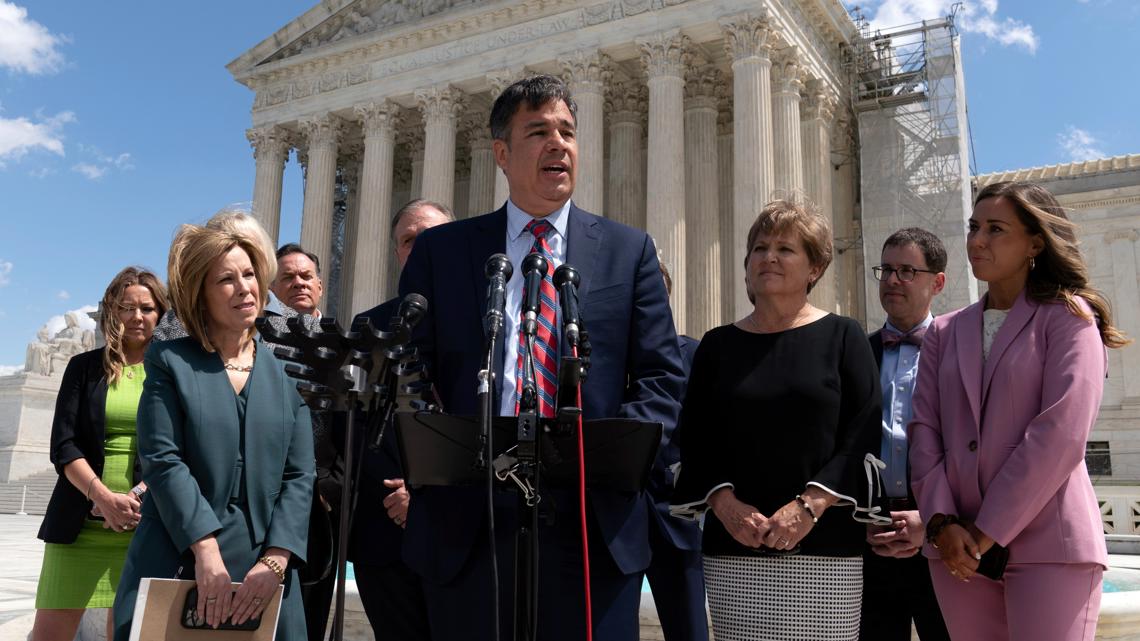
“The bottom line is this: Idaho’s law and EMTALA are consistent. They both seek to protect the lives of women and their unborn children," Labrador said. “Idaho chose to protect the lives of every woman and every child.”
He also addressed reports that some Idaho women with pregnancy complications had to be flown out of state to receive care.
“What’s telling is, I think you heard during the argument that there were all these issues about people being airlifted, women being airlifted out of Idaho. What’s telling is that they never said that under oath. Once again, all the examples they’re using under oath are examples that are covered by Idaho law. But they're going to the press and they’re making all these statements that are clearly misinformation in my opinion, and they’re trying to scare people into compliance with something that they want to do and the reality is that our law is very clear: it protects doctors, it protects women, it protects unborn children and it ensures that the doctors and use a subjective standard if they believe that the life of the mother is in jeopardy. It doesn’t have to be imminent. They just believe that the life of the mother is in jeopardy. It allows them to perform an abortion and it’s really hard for me to conceive of a single instance where a woman has to be airlifted out of Idaho to perform an abortion. In fact, I have talked to doctors in the ER, the same ER rooms that they’re talking about and they are telling me that they have no idea what this administrator is talking about.”
“I would like to get some more information on this. In my opinion, if somebody is being transferred out of the state of Idaho, whose life is in jeopardy, that actually doesn’t conform with their, with their practice and the things that they’re supposed to be as doctors. So I would hate to think that St. Luke’s or any other hospital is trying to do something like this just to make a political statement which I think is actually dangerous to the health and life of the woman in Idaho.”
Patient airlifted
One day before those arguments, KTVB spoke with Dr. Jim Souza of St. Luke's in April. At that time, he said six St. Luke's patients had been transported out of Idaho with pregnancy complications.
Statewide, that number was likely more than 12.
KTVB spoke with a patient who was airlifted out of Idaho in April 2024 due to pregnancy complications.
For her privacy, she requested to be identified only as Lauren, to avoid the attention that could come with sharing her story.
Lauren says she learned she was pregnant with twins about eight weeks in.
"We laid down and the ultrasound technician did her thing and asked us if we were feeling lucky cause there were two in there," she said.
Twin pregnancies can cause problems, so it's common to be seen by a Maternal Fetal Medicine (MFM) specialist early on.
"By the time we got to our 18-week appointment, we had identified I have a shortened cervix, which is very common in twin pregnancies, so we switched to full-time with a MFM," Lauren said.
"So basically your body was saying, 'I'm ready to give birth,' but your babies are like, 'this is not the time,'? Brian Holmes asked.
"Yeah, the babies are like, 'We don't have all of our little organs developed. We're not ready to leave the womb.'"
Lauren said for a while, she and her husband were leaving every appointment crying.
"This was very much a wanted pregnancy," she said.
Two weeks later, Lauren's cervix was even shorter, which meant she needed emergency surgery for what's called a 'cervical cerclage.' It's a stitch meant to keep the cervix closed as a last resort to keep her twins from being born too soon.
"24 weeks would be viability and so we were really hoping that the surgery would be successful, there wouldn't be complications and we'd get to stay pregnant into viability," Lauren said.
But one morning, at just 21 weeks into her pregnancy, Lauren said she woke up in a pool of blood and went to the emergency room.
"With the bleeding, I think the primary concern there is placental abruption," she said. It's a condition that can quickly be life-threatening to both the mother and the fetus.
"It's like, 'We don't know which way this is going to go,'" Lauren said. "'We don't want to put you as our patient in the position where you've run out of time to receive stabilizing treatment that is not legal here in Idaho.'"
"So you spent a day at the hospital mulling your options and you decided you need to go elsewhere?" Holmes asked.
"Yes, and not we need to go elsewhere because we have this decision made but we need to go elsewhere where we have some options while there are still time to make some options," she said.
Lauren was taken by an air ambulance to a hospital in Utah. There, she said she was given options, which also included the possibility of terminating her pregnancy.
"There was still a hint of hope for stabilization which ultimately did end up happening for us," Lauren said. "The bleeding ended up slowing down and stopping."
Lauren spent 11 days in in-patient care at a Salt Lake City hospital.
"It's a lot, especially when it's not specialized care I shouldn't have been able to receive in my hometown, you know?"
One of the days she was there was the day SCOTUS heard oral arguments in Moyle v. United States and Idaho v. United States.
She said she also heard about Idaho's Attorney General Raul Labrador's comments from the Supreme Court steps.
"In my opinion, if somebody is being transferred out of the state of Idaho whose life is in jeopardy that actually doesn't conform with their practice and the things they're supposed to be as doctors," Labrador said.
"I'm like, I'm one of those in that statistic, like, I was one of them. So it was definitely a huge slap in the face," Lauren said.
"Why did you want to share your story?" Holmes asked.
"I think it's important people know what could potentially happen to them, you know? Even if they think everything's fine after 12 weeks."
"Any family considering getting pregnant in Idaho should be aware of what could happen to them."
Pregnant Women Leave Idaho
Rebecca Vincen-Brown and her husband wanted to take the next step in their journey as a family.
"We had been trying for a year to grow and expand our family from one to two," she said.
They found out she was pregnant with their second child in November 2022.
"We were ecstatic, absolutely ecstatic," Vincen-Brown said.
It was three months after Idaho's total abortion ban took effect. At the time, all abortions were outlawed.
"I didn’t think that ban would affect me at all," she said. "When it did, it was shocking and quite infuriating."
At 16 weeks, an ultrasound revealed devastating news.
"It was at that time that we knew it wasn’t ok. Our baby, something was wrong with our baby," Vincen-Brown said.
A maternal-fetal medicine specialist diagnosed their baby with 'triploidy,' an extremely rare, life-threatening genetic condition that usually leads to miscarriage or early death.
"How did (the doctor) phrase that?" KTVB's Morgan Romero asked Vincen-Brown.
"It was something along the lines of, 'there's no medical intervention that can save this baby,'" she answered.
When asked about the feeling, Vincen-Brown said, "heavy. Like you drop a rock and the Earth stood still."
Jillaine St. Michel's second pregnancy went smoothly.
"A planned for, wanted pregnancy," she said. "I felt so good about that pregnancy."
She said everything was good, until late November 2022.
"At our 20-week anatomy scan, we found out things were not progressing the way they should have," St. Michel said. "We were told our baby was not developing properly, the issue probably started at an early gestational age … So many organ systems were involved at a very, very severe level."
Like Vincen-Brown, St. Michel was told her baby likely wouldn't survive.
The women also learned their health was at risk.
"If I were to continue the pregnancy with the baby, it would give me a higher risk of preeclampsia or hemorrhage or any other medical risks with miscarrying," Vincen-Brown said.
"There was another diagnosis of fetal hydrops, which could have potentially impacted my health down the road too," St. Michel said.
Their providers told them their options were limited.
"(The doctor) said, ‘if you want more imaging, I can give you a referral for a pediatric specialist to figure out the extent,’" St. Michel said.
"You can continue your pregnancy and chances that it miscarries, or you can have an abortion," Vincen-Brown said.
Those risks to their health, coupled with their babies' conditions, led them to make the difficult decision to get an abortion.
"Continuing on with a pregnancy that is nonviable to us felt like an unnecessary risk to take," St. Michel said. "We knew what we wanted to do, what felt like the most compassionate thing for us and that baby and our family."
"There’s nothing that could give this baby a life at all actually and that’s why we decided on that day we would go get an abortion," Vincen-Brown said. "If something were to go wrong because I had to carry it, that not only puts my health at risk but also puts stress on my family."
But getting an abortion in the state of Idaho wasn't an option for them.
In Idaho, abortions are only allowed in cases of rape or incest, coupled with a police report, and to "prevent the death of the pregnant woman."
The abortion bans don't include exceptions to protect the pregnant person's health.
Doctors who perform illegal abortions face threats of losing their medical license, thousands of dollars in fines, and prison time.
"Obviously, on top of devastating news, that was terrible to hear," St. Michel said.
"Doctors are extremely confused about what type of care is permitted and under what circumstances," said Gail Deady, an attorney for the Center for Reproductive Rights. "And they are also very fearful of providing even life-saving abortion care in Idaho because they don’t know what actions may land them in prison."
Deady added it’s leading to patients like Vincen-Brown and St. Michael, who are in medical emergencies, being turned away.
"Doctors are erring on the side of caution," Deady said.
"My life was not currently at risk. And what is the level of risk? What is life-threatening?" Vincen-Brown said. "There’s no terminology saying what is and what isn’t."
Both women had to scramble to find clinics out of state that could take them quickly and perform late-stage abortions.
They said their insurance didn't cover their expensive procedures in Oregon and Washington, and they had to pay hundreds of dollars for travel and hotels.
But they said the worst part was the lasting trauma of their experiences.
"I had to be there by myself to go through it all and it was really, really devastating," St. Michael said. "I think that the hardest part of it all is not being able to grieve with my husband and him not having the chance to say goodbye. That was taken from him because we had to go out of state and that’s not right."
Vincen-Brown's procedure required two steps over two days, but after the first step, things took an unexpected turn.
"I started contracting right around midnight and so we gave the on-call doctor a call," she said. "He said, 'hang tight, it’ll be ok.' Contractions were consistent. Right around 4 a.m., I ended up passing the baby in the hotel bathroom, all while my 2-year-old was on the other side of the door."
Vincen-Brown said "the trauma of the whole situation would not have happened if I stayed in Idaho with my physician at home."
"What did they say they could have done for you if abortion had still been legal in Idaho?" Romero asked.
"I would have been able to have the procedure in the hospital and then I would have been able to get genetic testing on-site," Vincen-Brown said.
"It wasn’t until I returned home and processed everything that I realized how insane it was we had to do it in that way and how degrading it was to have to flee from my home to receive this care," St. Michael said. "I didn’t want an abortion. I didn’t want to be there."
"I remember telling my husband there has to be a purpose," she added. "I’m going to make this really terrible experience mean something."
When she found out the Center for Reproductive Rights planned to sue the state and Board of Medicine over Idaho's strict abortion bans, she said she realized that was her purpose.
"This is the reason for this," St. Michael said. "I need to share my experience and up until then I hadn’t."
Vincen-Brown's OBGYN told her about the lawsuit a few months after her abortion. She said it spoke to her.
"That was when I decided it was time to do something," she said.
They're suing on behalf of patients and doctors, looking for clarification from the courts.
Deady, the lead attorney on the case, said they want to add exceptions to the bans to ensure providers can perform abortions to preserve a pregnant person's health and safety, including when the fetus is diagnosed with a deadly condition.
"It’s simply a statement that if someone is experiencing an emergent medical condition, meaning a condition that could result in significant harm to health, life, future fertility, that that person be permitted to have abortion care in Idaho based on good faith medical judgment of their providers," Deady said.
Vincen-Brown and St. Michael were able to get pregnant again and fulfill their dream of growing their families.
"Unfortunately, I didn’t allow myself to feel bonded with this pregnancy, which is really sad to think about how it’s changed now," St. Michael said.
"The nursery that we had, I didn’t realize it emotionally affected me as much as it did until reflecting back on it but we didn’t even open the nursery or look into it," Vincen-Brown said. "I didn’t emotionally get excited about little Harlow until about 20 weeks when we had that ultrasound."
Both women hope by expanding the exceptions, other Idahoans won't endure the same pain and trauma they did.
"If it could happen to us, it could happen to anybody," Vincen-Brown said. "I have two girls now, why should somebody else’s girls have to go through that, or any woman in general? It’s quite barbaric. We live in the 21st century, why is this happening?"
"We were going to name the baby Beckett. We have tried our best to talk about her, make sure Finley knows she’s real," St. Michel said. "We just never want to forget her and we’re just really hoping that her life has purpose in this way, that we can honor her and hopefully because of our story and others like ours, we can make life better for women in this state."
Health Care Challenges
In rural Idaho, practicing family medicine brings unique challenges, as well as burdens.
“It’s a wonderful job,” said Dr. Julie Lyons, a family medicine physician in Blaine County. “But it was already exhausting and challenging and now especially with the women's health piece it’s gotten even worse.”
Lyons’ practice is dedicated in part to women’s health and obstetrics.
After the Supreme Court overturned Roe v. Wade with the Dobbs decision in 2022, the abortion regulations were handed back to the states, and Idaho’s near-total abortion ban took effect.
“Pre-Dobbs, if a patient needed health-saving abortion or abortion for a fetal diagnosis, we were able to provide that in the state of Idaho,” Lyons said. “That often happened in consultation with our perinatologist and often happened that day or the next day. Everything we do now, we have to tiptoe around very carefully."
The way doctors discuss care has also changed. For two years, conversations have shifted to what happens if the woman has an emergency, chooses to go out of state for a surgical abortion or induction of labor.
“It really turns this happy visit into something a lot more nuanced and challenging,” Lyons said.
Doctors are also talking to patients about getting life flight insurance.
“Instead of talking about happy moments and vitamins and nutrition and getting enough sleep, now I’m counseling women about what would happen if your baby has a fatal fetal diagnosis or if you develop health risk,” Lyons said.
Today, doctors face threats of losing their medical license, thousands of dollars in fines, and even prison time if they perform an illegal abortion.
“That has cast this huge web of uncertainty,” Lyons said.
Doctors say they’re struggling to navigate the exceptions to Idaho’s abortion bans, saying they now must call their health systems’ attorneys when the recommended treatment is abortion.
“How does a doctor decide the health, long-term health impacts versus the life of the mother? How does one decide that in that moment?” KTVB's Morgan Romero asked.
“That’s the inherent controversy, really, is that every patient has their own unique story, and the law does not allow us to discern that or advocate for that unique story,” Lyons responded.
Doctors say some patients aren’t getting the care they need.
“Abortion is health care,” Lyons said. “It is often the number one treatment for pregnancy conditions and making that access so impaired really puts people at risk.”
To get clarity on the laws, Lyons, along with a Boise-based OBGYN, the Idaho Academy of Family Physicians, and four Idaho women, filed a lawsuit against the state, Governor Brad Little, Attorney General Raul Labrador and the Board of Medicine.
“Asking our state to maybe take their hands off some of the gags and restrictions placed on us as physicians,” Lyons said.
Specifically, so they can use their good faith medical judgement to provide abortions for women who face health risks, and whose babies aren’t expected to make it to term or survive for long outside the womb.
In a newsletter published in early May 2024, Attorney General Raul Labrador said he made it clear in court.
"If a doctor believes in good faith that the termination of a woman’s pregnancy is necessary to save her life—regardless of how imminent that risk is—Idaho law allows it," Labrador wrote.
“I mean, that boils my blood, honestly,” Lyons said. “None of us want to wait until that patient is too sick … When are you supposed to determine when the right time to trigger that care is?”
A report from the Idaho Physician Well-Being Action Collaborative shows Idaho lost 22% of its obstetricians between August 2022 and November 2023, and more than half of the state’s maternal fetal medicine specialists (MFMs) left.
Though the report doesn't say why, two doctors who did leave, Dr. Kylie Cooper and Dr. Lauren Miller, blame Idaho’s laws.
“This was 100% the abortion ban that influenced our decision to leave,” Cooper said.
Both women say they stayed in Idaho for several months after the bans took effect, adding they tried to work with legislators and leaders to change the laws to allow for abortions when the mother’s health is at risk, not just her life.
“The laws are vague, which is really hard because you know medicine is very gray,” Cooper said. “Trying to apply a new kind of legal definition to the way that we care for patients was just really quite impossible to do.”
“There’s that fear someone could question your decision in that moment,” Miller added. “Until somebody is actively dying in front of you, meaning you’re coding them… doing things to sustain their blood pressure in body, you don’t know they’re 100% going to die. And that’s a gray zone that’s impossible to navigate.”
“It's just not the way that medicines practiced,” Cooper said. “We want to avoid those complications. So, when we have a diagnosis that we know how risky it is, you know, we intervene before those really serious health complications arise.”
Both women said they didn’t feel heard by Idaho’s elected officials.
“It feels like an attack on who we are and, on our education, and how much experience and time we’ve given to health care,” Cooper said. “It feels like the lack of trust from those around us.”
Both ultimately decided to leave Idaho, they say, to protect their families, careers and lives.
“It’s a wrenching experience,” Miller said. “I have to act to protect my patient’s health and I know myself well enough that I could not sit by and watch a patient getting sicker and getting sicker and getting sicker and not act.”
“If I stayed in Idaho, I knew that I would potentially commit a crime,” Miller added.
“That's been kind of a weight lifted, to be able to just go back to caring for people in the way that I'm, you know, supposed to be able to care for people,” Cooper said. “But I also feel, you know, a lot of guilt about leaving. It was a very difficult decision, you know, we were very happy and settled.... leaving is one less obstetrical provider in a state that already is struggling with having access to health care and maternal care deserts, and how that was going to further impact things."
A 2022 report shows about a third of Idaho counties were considered maternal care deserts before the bans went into effect, meaning they lacked maternity resources, didn’t have hospitals or birth centers with obstetric care and had no obstetric providers.
Since the summer of 2022, three obstetric programs have closed.
Federal data shows 90% of the United States has better maternal pregnancy outcomes than Idaho.
“Those that remain, it increases our burden of the number of patients we have to see, treat and triage,” Lyons said. “I think it could potentially ignite a collapse of our health care system.”
Lyons trains medical students as part of the University of Washington’s Idaho program. She said she sees first-hand how the state is struggling to recruit doctors and medical residents, particularly in rural Idaho.
“Our residents are no longer getting the kind of training they need even to manage a high-risk miscarriage situation that might come into rural,” Lyons said.
“I can't imagine choosing to move somewhere where you can't practice medicine in the way that you were trained to do,” Cooper added.
As things are now in Idaho, doctors say the weight of their burdens will lead to more burnout impacting women's healthcare.
“I imagine we will have very barren medical landscape here,” Lyons said. “I imagine mental and physical health in women will decline. I imagine a very bleak future if we don’t change this.”
“I would just ask our lawmakers to really sit down and talk with more doctors,” she added. “We are the people taking care of Idahoans.”
Lyons is taking a year-long sabbatical to consider whether she wants to continue delivering babies in Idaho. She says she’s worried about raising her kids safely should she keep practicing.
Currently, there is an effort to get abortion access on the ballot in 2026 and let Idahoans decide what the laws should look like.
The group leading the effort, Idahoans United for Women and Families Coalition, needs to gather enough signatures before they’re able to do so.
Watch more Local News:
See the latest news from around the Treasure Valley and the Gem State in our YouTube playlist:
HERE ARE MORE WAYS TO GET NEWS FROM KTVB:
Download the KTVB News Mobile App
Apple iOS: Click here to download
Google Play: Click here to download
Watch news reports for FREE on YouTube: KTVB YouTube channel
Stream Live for FREE on ROKU: Add the channel from the ROKU store or by searching 'KTVB'.
Stream Live for FREE on FIRE TV: Search ‘KTVB’ and click ‘Get’ to download.


